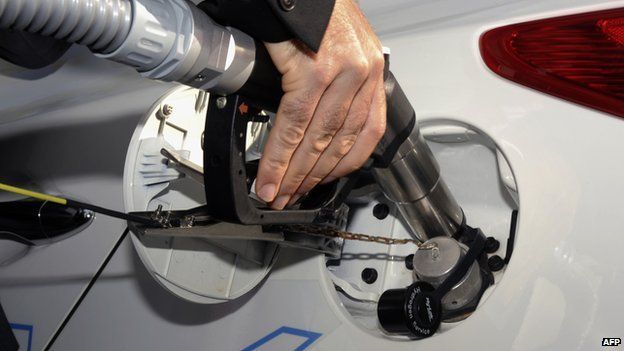Hydrogen's energy promise improves
- Published

A new process for extracting hydrogen from a liquid fuel could sweep aside one obstacle to a "hydrogen economy".
Hydrogen produced from renewable resources is a promising source of clean energy, but the gas is difficult to handle and transport.
An international team has now published details of an efficient, low-temperature method for generating it from methanol.
This can then be used to produce electricity using a fuel cell.
The research has been outlined in the journal Nature.
Hydrogen has a high energy density and is clean - burning to leave only water vapour.
Proponents of a hydrogen economy want to produce the hydrogen with excess electricity from renewables such as wind power and solar energy.
But hydrogen can only be conveniently transported and stored if it is liquefied or compressed, a process that requires a great deal of energy.
Methanol contains 12.6% hydrogen and is a liquid at ambient temperature, enabling it to be used as a means of temporarily "storing" hydrogen until it is needed.
Current methods used to release the gas from methanol require high temperatures (above 200C) and high pressures, which limits the potential applications.
'Promising' method
The new approach described by Matthias Beller, from the University of Rostock, and colleagues uses a ruthenium-based catalyst, which can efficiently generate hydrogen from methanol at 65-95C and at ambient pressure.
The authors believe their system could combine the advantages of methanol as a hydrogen carrier and of proton-exchange membrane (PEM) fuel cells for efficient energy production. PEMs are one of the most promising fuel cell technologies.
Prof John Loughhead, executive director of the UK Energy Research Centre, said the study was "a very interesting step, and could lead us to much easier and better performance systems for... storage and transport".
But he said that it would "need further development before we can say with certainty".
Prof Loughhead explained: "As methanol contains 12.6% hydrogen by weight, and is a liquid transportable like petrol, this promises to considerably out-perform other... storage systems which typically contain 4% by weight of hydrogen."
He added: "There are issues to resolve to get this into practical service, such as how long does the reaction take, can it respond to changing need, what control and containment systems will be needed, will buffer stores of pure hydrogen be needed, and thus how large, weighty, and expensive would a practical system be?"
Related Topics
- Published20 September 2011
- Published15 August 2011
- Published23 December 2010